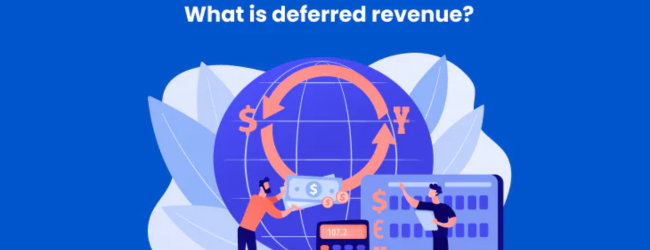Table of contents
- What is Deferred Revenue?
- Why is Deferred Revenue Important?
- How Does Deferred Revenue Work?
- Common Examples of Deferred Revenue
- Journal Entry for Deferred Revenue
- Deferred Revenue vs Accrued Revenue
- Benefits of Proper Deferred Revenue Management
- Risks of Ignoring Deferred Revenue
- Best Practices for Managing Deferred Revenue
- Key Takeaways
- Conclusion
- Frequently Asked Questions (FAQs)
Deferred revenue is a key accounting concept that many business owners overlook, yet it plays a crucial role in managing your company’s finances correctly. Whether you’re running a SaaS startup, a coaching business, or a subscription-based platform, understanding deferred revenue helps ensure your financial statements are accurate and compliant with accounting standards.
This in-depth guide will help you understand what deferred revenue is, how it works, and why it matters for your business in India or anywhere else.
What is Deferred Revenue?

Deferred revenue, also known as unearned revenue, refers to payments received by a business before it has delivered the product or service. Since the business hasn’t yet “earned” this money, it’s temporarily recorded as a liability.
In simple words: If a customer pays you ₹1,00,000 in advance for a one-year subscription, you cannot treat it as revenue until you actually provide the service over the year.
Why is Deferred Revenue Important?
Deferred revenue helps you:
- Maintain accurate financial statements
- Avoid overstating profits
- Manage tax implications
- Comply with accounting standards like GAAP or IAS
How Does Deferred Revenue Work?
Let’s say a customer pays ₹12,000 for a 12-month service.
| Month | Action | Accounting Treatment |
| Jan (payment received) | ₹12,000 received | Record ₹12,000 as deferred revenue (liability) |
| Feb to Dec | Service provided monthly | Each month, ₹1,000 is moved from deferred revenue to earned revenue |
Real-Life Example from India
Example: Amazon Prime Membership (India)
When you pay ₹1,499 for a 12-month Prime subscription:
- Amazon records ₹1,499 as deferred revenue initially.
- Every month, it transfers ₹124.92 (₹1,499 ÷ 12) to actual revenue.
This way, revenue is matched with the period the service is provided.
Common Examples of Deferred Revenue
- Software subscriptions (e.g., Zoho, Freshworks)
- Annual maintenance contracts
- Event ticket pre-bookings
- Advance rent for co-working spaces
- Online course enrollments
- Gym memberships
- Magazine or newspaper subscriptions
ALSO READ – Major Difference Between Capital Expenditure and Revenue Expenditure for Indian Businesses
Journal Entry for Deferred Revenue
When you receive the payment:
- Dr. Bank Account – ₹10,000
- Cr. Deferred Revenue – ₹10,000
When you earn the revenue:
- Dr. Deferred Revenue – ₹1,000
- Cr. Revenue/Income – ₹1,000
Deferred Revenue vs Accrued Revenue
| Basis | Deferred Revenue | Accrued Revenue |
| Meaning | Revenue received before services | Revenue earned but not yet received |
| Account Type | Liability | Asset |
| Example | Annual subscription paid upfront | Service completed, but invoice pending |
Benefits of Proper Deferred Revenue Management
- Improves trust with investors and auditors
- Accurate cash flow management
- Helps in forecasting future revenues
- Reduces the risk of non-compliance or penalties
- Ensures better decision-making for scaling the business
Risks of Ignoring Deferred Revenue

- Overstated income and profits
- Tax mismatches
- Loss of credibility with stakeholders
- Misleading financial projections
- Auditor red flags
Best Practices for Managing Deferred Revenue
- Use cloud accounting software like Tally, Zoho Books, QuickBooks
- Set up automatic revenue recognition schedules
- Train finance teams to record it correctly
- Regularly reconcile deferred revenue balances
- Consult with an expert accountant
ALSO READ – What Is Revenue Expenditure? Meaning, Examples & Importance
Key Takeaways
- Deferred revenue is income received before delivering goods or services.
- It’s recorded as a liability on the balance sheet, not income.
- Recognising deferred revenue properly is essential for compliance and transparency.
- Common examples include prepaid subscriptions, advance bookings, and annual service fees.
Helps businesses manage cash flow and revenue forecasting better.
Learn more about Business skills here to unlock new growth opportunities
Need Expert Guidance?
Starting a business can be challenging, but you don’t have to do it alone! At Boss Wallah, our 2,000+ business experts are ready to provide valuable insights and guidance. Whether you need help with marketing, finance, sourcing, or any other area of your business, our business experts are here to help you succeed
Confused about Which Business to Start?
Want to start your own business but unsure which one to choose? Explore Boss Wallah, where you’ll find 500+ courses by successful business owners, featuring practical, step-by-step guides on starting and growing various businesses. Find your perfect business idea today
Conclusion
Understanding what deferred revenue is and managing it well is a sign of a financially mature business. It’s not just about compliance, it’s also about strategic planning and transparent operations. Whether you’re an MSME owner or startup founder in India, integrating deferred revenue into your financial workflow can help scale your operations with confidence and credibility.
Explore more blogs to learn more about Business
Frequently Asked Questions (FAQs)
It’s money received before delivering goods or services treated as a liability until earned.
It’s recorded as a liability.
Not immediately. Tax is applicable when revenue is earned.
Yes, especially if they offer advance-paid services or subscriptions.
Deferred revenue is received but not earned; accrued revenue is earned but not received.
SaaS, edtech, fitness, hospitality, media, and more.
Until the service or product is fully delivered, it can range from days to years.
Yes, it helps avoid inflating profits prematurely.
No, because it’s a liability, not a current asset.
No, but it can be reduced if services are rendered or the customer cancels



